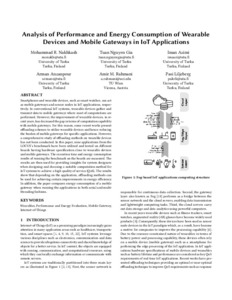Analysis of performance and energy consumption of wearable devices and mobile gateways in IoT applications
Nakhkash M.; Gia T.; Azimi I.; Anzanpour A.; Rahmani A.; Liljeberg P.
https://urn.fi/URN:NBN:fi-fe2021042824195
Tiivistelmä
Smartphones and wearable devices, such as smart watches, can act as mobile gateways and sensor nodes in IoT applications, respectively. In conventional IoT systems, wearable devices gather and transmit data to mobile gateways where most of computations are performed. However, the improvement of wearable devices, in recent years, has decreased the gap in terms of computation capability with mobile gateways. For this reason, some recent works present offloading schemes to utilize wearable devices and hence reducing the burden of mobile gateways for specific applications. However, a comprehensive study of offloading methods on wearable devices has not been conducted. In this paper, nine applications from the LOCUS's benchmark have been utilized and tested on different boards having hardware specification close to wearable devices and mobile gateways. The execution time and energy consumption results of running the benchmark on the boards are measured. The results are then used for providing insights for system designers when designing and choosing a suitable computation method for IoT systems to achieve a high quality of service (QoS). The results show that depending on the application, offloading methods can be used for achieving certain improvements in energy efficiency. In addition, the paper compares energy consumption of a mobile gateway when running the applications in both serial and multithreading fashions.
Kokoelmat
- Rinnakkaistallenteet [27094]
